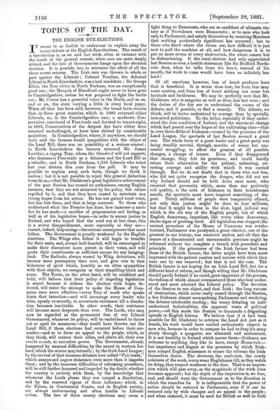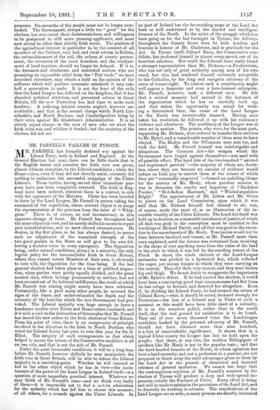TOPICS OF THE DAY.
THE ENGLISH BYE-ELECTIONS.
IT seems to us foolish to endeavour to explain away the recent defeats at the English Bye-elections. The result of a bye-election is, as we said last week, often at variance with the result of the general contest, when men are more deeply stirred, and the fate of Governments hangs upon the electoral decision. It is possible, too, to minimise the effect of all the three recent returns. The Irish vote was thrown in whole or part against the Liberals ; Colonel Tomline, the defeated Liberal in North Lincolnshire, was a bad candidate ; Sir George Elliot, the Tory victor in North Durham, was an exceptionally good one ; the Marquis of Blandford ought never to have gone to Cambridgeshire, unless he was prepared to fight the battle out ; Mr. Cowen has a powerful voice in the North, and so on, and so on, the story varying a little in every local paper. When all that has been said, however, the broad facts remain that, in three great counties, which in 1880 returned either Liberals, or, in the Cambridgeshire case, a moderate. Con- servative, convinced of Free-trade and devoted to tenant-right, in 1881, Conservatives of the deepest dye have either been returned unchallenged, or have been elected by considerable majorities. In Cambridgeshire, where, if anywhere, we should have said the farmers would sympathise with the object of the Land Bill, there was no possibility of a serious contest ; in North Lincolnshire the farmers returned Mr. James Lowther, a raging Tory, whom the Standard will not support, who denounces Free-trade as a delusion and the Land Bill as a swindle ; and in North Durham, 1,350 Liberals who voted last year abstain this year from the poll. It may be possible to explain away such facts, though we think it useless ; but it is not possible to reject this general deduction from them,—that Mr. Gladstone's great legislative achievement of the past Session has roused no enthusiasm among English farmers, that they are not attracted by his policy, but rather repelled by it, and that they have ceased to entertain any strong hopes from his action. He has not gained rural votes, but has lost them, and that in large measure. To those who understand what the Premier has done, how immense a sacri- fice he has made—a sacrifice of prepossession and feeling, as well as of his legislative hopes—in order to secure justice to Ireland, and who hoped that the road was at last clear, this is a severe disappointment, more especially as they see— cannot, indeed, help seeing—the serious consequences that must follow. The Government is greatly weakened by the English elections. The Whigs who follow it will begin to tremble for their seats, and, always half-hearted, will be encouraged to make their discontent more patent in their votes, and will quote their constituents as sufficient excuse for any hanging- back. The Radicals, always roused by Whig defections, will become more peremptory than ever, and give rein to that bitterness of spirit which, heartily as we often sympathise with their objects, we recognise as their stumbling-block and snare. The Tories, on the other hand, will be confident and bold, will believe that their policy of impeding legislation is sound because it sickens the electors with hopes de- ferred, will resist the attempt to make the House of Com- mons once more effective—every Tory of mark who speaks hints that intention—and will encourage every leader who tries, openly or secretly, to accentuate resistance till a dissolu- tion becomes inevitable. In other words, their resistance will become more desperate than ever. The Lords, who may now be regarded as the permanent foes of any Liberal Government, whatever its policy, will be emboldened to throw out or spoil its measures—they would have thrown out the Land Bill, if these elections had occurred before their sur- render—and so to force an appeal to the people, which, as they think, will restore their allies, and above all, their own couche sociale, to executive power. The Government, already hampered by unusual difficulties, by the unrest in western Ire- land, which the winter may intensify; by the Irish Land League; by the revival of that tiresome delusion now called "Fair trade," which annoys and angers statesmen even more than it impedes them ; and by the immense difficulties of reforming procedure, will be still further harassed and impeded by the doubt whether the country is entirely with them, by the knowledge that whenever the Lords please they can compel a dissolution, and by the renewed vigour of those influences which, in the Palace, in Continental Courts, and in English society, are always embarrassing and often hostile to Liberal action. The loss of three county elections may seem a light thing to Democrats, who are as confident of ultimate vic- tory as if Providence were Democratic ; or to men who look only to Parliament, and satisfy themselves by counting Members that nothing particularly significant has occurred ; but to those who know where the forces are, how difficult it is just now to pull the machine at all, and how dangerous it is to put on more steam at every obstruction, the event cannot but be disheartening. If the rural electors had only appreciated last Session as even a hostile statesman like Sir Stafford North- cote does, when he talks from his heart, instead of his mouth, the work to come would have been so infinitely less hard 1.
Of all emotions, however, loss of heart produces least that is beneficial. It is worse than fear, for from fear may come caution, and from loss of heart nothing can come but lassitude and feebleness. We may be perfectly sure that Mr.. Gladstone, who is sanguine as well as dour, has lost none ; and the duties of the day are to understand the causes of the defeats, and if possible, to find a remedy. The defeats, we think, will be better understood by average than by specially instructed politicians. To the latter, especially if they under- stood the true condition of Ireland, and the enormous change which had passed over the hopes of the cultivating class—that is, over three-fifths of Irishmen—roused by the promises of the Land League, the spectacle of last Session seemed a great one. The whole force of a great leader and a great party was being steadily exerted, through months of weary but suc- cessful struggling, to effect the greatest of all possible changes, a change of tenure. Even if they disapproved that change, they felt its greatness, and could hardly refuse their admiration for the patient, unhasting, un- resting courage and ability with which it was carried through. But we do not doubt that in those who saw less, who did not quite recognise the danger, who did not see why Ireland should not be held down once more, who resented that perversity which, more than any positively evil quality, is the note of Irishmen in their troublesome moods, the spectacle must have inspired something of dis- gust. Thirty millions of people were temporarily effaced, not only that justice might be done to four millions, but that it might be done in the slow, legal, judicial way which is the old way of the English people, but of which English democracy, impatient, like every other democracy, shows signs of growing tired. All legislation was stopped, the ancient procedure of the House of Commons was revolu- tionised, Parliament was paralysed, a great election, one of the greatest in our history, was rendered useless, and all that the tenure of a discontented and unreasonable province might be reformed without too complete a breach with precedent and principle. If the grievances of the Irish farmer had been those of the British farmer, the latter might have been more impressed with the patient caution and success with which they were one by one removed ; but that is not the case. The British farmer is not hoping for an Irish Land Bill, but for a. different kind of reform, and though willing that Mr. Gladstone should pacify Ireland if he could, grew impatient of the process, the tedium of which almost overmastered those who best under- stood and most admired the Liberal policy. The devotion of the Session to one object, and that Irish ; the long success of obstruction, which never really ceased through the Session, a few Irishmen almost monopolising Parliament and rendering the debates intolerable reading ; the weary debating on half- understood technicalities, the apparent waste of political power —all this made the Session to thousands a disgusting episode in English history. We believe that if it had been possible for Mr. Gladstone to octroyer the Land Act just as it stands, his work would have excited enthusiastic respect in men who, because in order to conquer he had to drag his army slowly through a quagmire, are alienated and malcontent. It is not hostility to Ireland which moves them—Irishmen are welcome to anything they like to have, except Home-rule- but impatience and disgust at the processes by which Irish- men compel English statesmen to secure the reforms the Irish themselves desire. The slowness, the confusion, the rowdy noisiness of the work, worry some Englishmen till, as they watch its doing, they suspect weakness in the doer. That is an impres- sion which will pass away, as the magnitude of the work done becomes apparent ; but the depth of the impression is, we fear, real, and should warn the Government as to the direction in which the remedies lie. It is indispensable that the power of action should be restored to Parliament, even if it can be restored only by wide changes and an appeal to the people ; and when restored, it must be used for British as well as Irish
purposes. Six-sevenths of the people must not be longer over- looked. The Government, always a little too " good " for the electors, has over-rated their disinterestedness and willingness to be postponed to still more pressing applicants, and must now attend to other than strictly Irish needs. The position of the agricultural interest in particular is, by the consent of all members of the Cabinet, very bad, and rural reform in Britain, the enfranchisement of the soil, the reform of county govern- ment, the extension of the rural franchise, and the readjust- ment of local taxation, should no longer be delayed. If it is, the dreamers and charlatans and interested orators who are promising an impossible relief from the "Fair trade" we have described elsewhere, may obtain a hold on the opinion of the sufferers which will produce economic mischiefs it may take half a generation to undo. It is not the least of the evils that the Land League has inflicted on the kingdom, that it has absorbed political attention, and prevented reform in Great Britain, till the new Protection has had time to make such headway. A suffering interest resents neglect, however un- avoidable ; and that is the second charge which North Lin- colnshire, and North Durham, and Cambridgeshire bring by their votes against Mr. Gladstone's Administration. It is an utterly unjust charge, in the eyes of men who see what the Irish crisis was, and whither it tended ; but the majority of the electors did not see.































 Previous page
Previous page